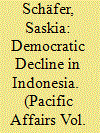| Srl | Item |
| 1 |
ID:
165724


|
|
|
|
|
| Summary/Abstract |
The Council of Indonesian Islamic Scholars (MUI) has exerted increased political influence in Indonesian politics since the fall of Suharto. Constituted by representatives from various Muslim civil society organizations, the Council was originally intended by Suharto to serve as a political representative for Indonesia’s two largest civil society organizations, the Muhammadiyah and the Nahdlatul Ulama. This article argues that in addition to its own non-democratic structures and its fatwas opposing democratic values, the MUI has contributed to Indonesia’s democratic stagnation and decline in two ways: by undermining the authority of elected state representatives through its anti-pluralist stance and its epistocratic claims, and by imperiling the fragile but functioning balance of religion and the state through its undermining of the long-established religious civil society organizations.
|
|
|
|
|
|
|
|
|
|
|
|
|
|
|
|
| 2 |
ID:
169257


|
|
|
|
|
| Summary/Abstract |
Religious knowledge is at the heart of the Shiʿi system of clerical authority known as the marjaʿiyya. Given the multiplicity of more or less well-established claimants to the position, this article explores the scholarly credentials of the contemporary marjaʿ[source of emulation; pl. marājiʿ]. I conceptualize the marjaʿiyya in accordance with Pierre Bourdieu’s notion of the field in order to examine how scholarly capital is defined, and possibly redefined, by 14 religious scholars competing in this marjaʿiyya field in Iraq. To do so, I use their ‘official’ biographies in Arabic and analyze the types of credentials of scholarly capital that are put forth to legitimate the claims of these marājiʿ. I argue that, despite the multiplicity and diversity of contenders, there is a fair degree of homogeneity in the ways scholarly capital is defined. In the biographies, the marājiʿ’s scholarly capital is validated against three broad indicators: their inherited scholarly capital, which stems from their family background; their educational capital; and the intellectual-scientific prestige capital derived from their scholarly and teaching activities. The credentials emphasized in the different biographies are generally much alike, and if a marjaʿ does not satisfy them, ‘almost-like’ credentials are constructed. Abidance to shared codes and practices reflects, as well as contributes to, the stability of the marjaʿiyya field.
|
|
|
|
|
|
|
|
|
|
|
|
|
|
|
|